Fenugreek Tea Benefits
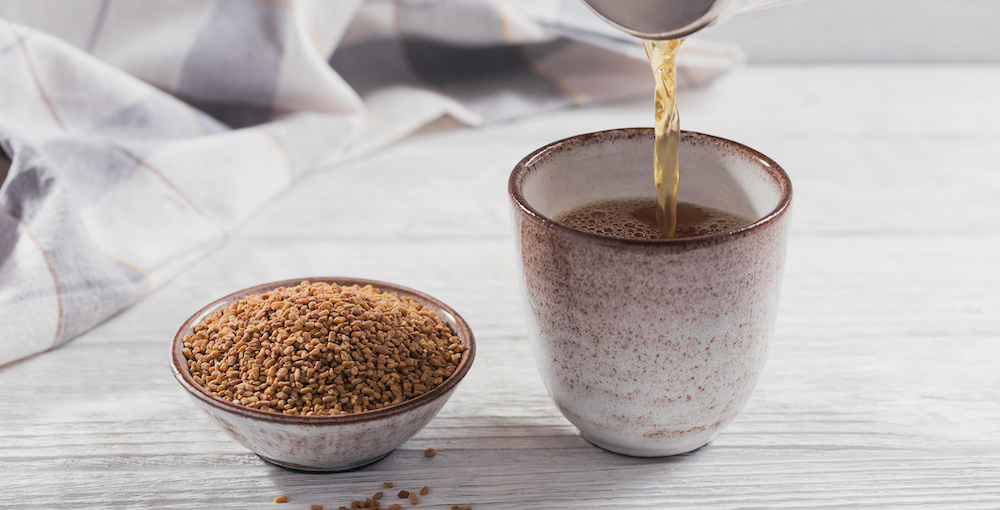
For centuries, fenugreek tea benefits have been revered as a powerful natural remedy for various ailments. This aromatic and sweet-tasting herb offers impressive benefits, including alleviating diabetes symptoms, easing menstrual cramps, and promoting lactation.
One of the key advantages of fenugreek tea is its ability to reduce inflammation in the body. This leads to better digestion, lowered cholesterol levels, and improved blood sugar control. Additionally, its antioxidant properties protect cells from harmful free radicals, potentially even offering anti-cancer benefit
For nursing mothers, fenugreek tea can be a game-changer. It is believed to increase milk production while providing essential vitamins and minerals for both mother and baby. However, it’s crucial to remember that professional medical advice should never be replaced, especially when monitoring the nutritional needs of an infant.
Delve into the extensive benefits of fenugreek tea and unravel the scientific findings and study results for a comprehensive understanding of its remarkable effects.
Table of Contents
- Fenugreek Nutritional Value
- Fenugreek Seed Tea for Breastfeeding
- Fenugreek Tea Benefits for Hair Health
- Fenugreek Tea Benefits for Skin
- Fenugreek Tea for Diabetes
- Fenugreek Tea Testosterone
- Can Aid you with Weight Loss
- Fenugreek for Sperm Count Benefits
- Fenugreek Tea for Cholesterol
- Side Effects of Fenugreek Tea
- In conclusion

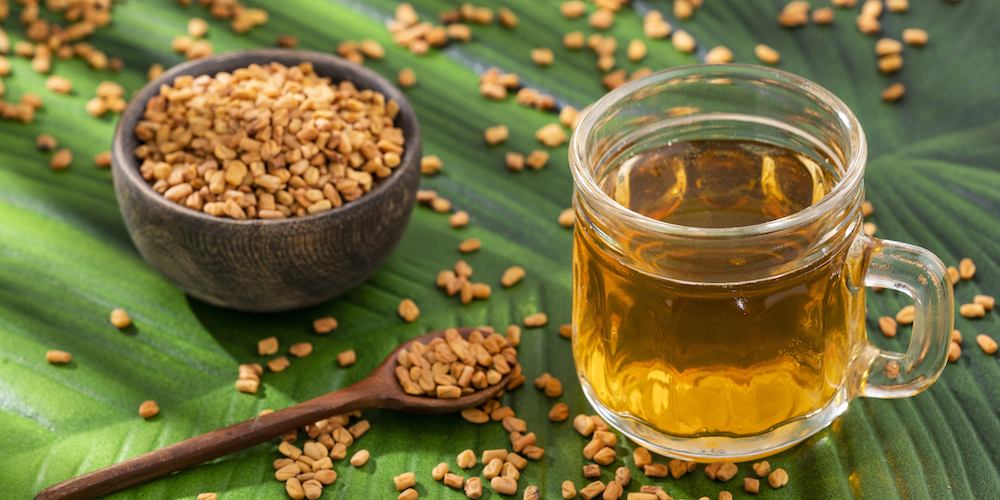
Fenugreek Nutritional Value
Fenugreek seeds are rich in protein and packed with essential vitamins and minerals. Just one tablespoon provides:
– Protein: 2.5 grams
– Fat: 0.7 grams
– Carbohydrates: 6.5 grams
– Dietary fibre: 2.7 grams
– Sodium: 7.4 milligrams
– Potassium: 85.5 milligrams
Discover the nutritional power of fenugreek seeds in a single serving.
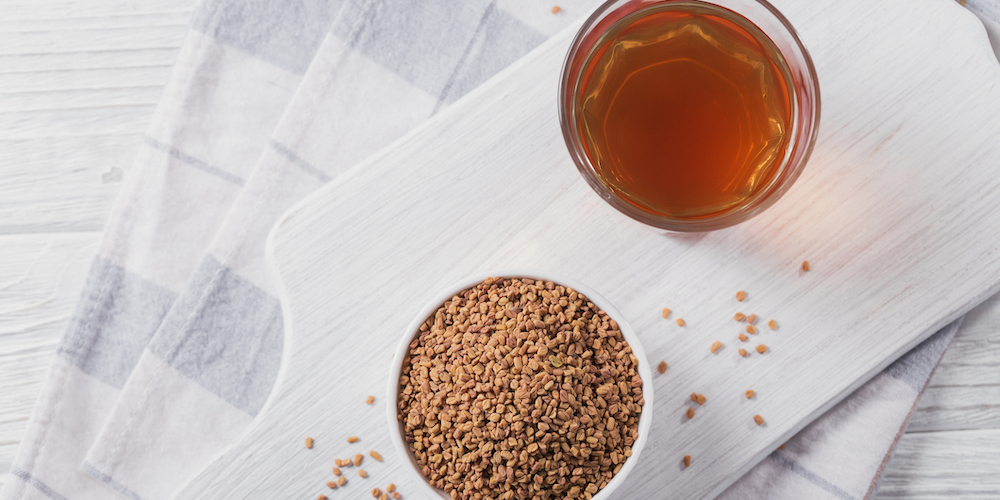
Fenugreek Seed Tea for Breastfeeding
Breast milk is a complete and essential source of nutrition for your baby during their first six months of life. It continues to provide a significant portion of their nutritional needs throughout their first year and beyond. Additionally, breast milk offers valuable protection against various infections.
Prescription drugs can increase breastmilk production, but fenugreek offers a safe and natural alternative, according to research.
In a 2011 study, researchers divided 66 mothers into three groups to examine the effects of drinking fenugreek tea. One group received fenugreek tea, another received a placebo, and the third group received no treatment.
The fenugreek group experienced a significant increase in pumped breast milk volume, going from approximately 1.15 ounces (34 mL) in the control and placebo groups to 2.47 ounces (73 mL). This research utilized this herbal tea in place of supplements, indicating that supplements may yield comparable outcomes.
While this research shows promise, it is important to consult a healthcare professional to address any concerns regarding breast milk production.


Fenugreek Tea Benefits for Hair Health
Fenugreek tea is loaded with essential nutrients that support healthy hair growth. It contains scalp-nourishing minerals such as iron, zinc, and potassium, which encourage strong hair follicles and prevent breakage. Furthermore, its content of vitamin C makes it an ideal antioxidant for protecting the scalp from oxidative damage by free radicals.
The extent of research on the hair growth benefits of these seeds is limited. However, a small study indicates that there may be some truth to these claims.
In a groundbreaking human study conducted in 2006, researchers examined the impact of a daily oral dose of fenugreek seed extract on 53 individuals over 6 months. The exciting results showed that over 80% of the participants who received the supplement experienced significant improvements in hair volume and thickness, surpassing those who were given a placebo.
This compelling evidence underscores the potential of fenugreek seeds as a game-changer in enhancing hair health. Further research is required to gain a deeper understanding of the potential of the seeds in preventing or treating hair loss.
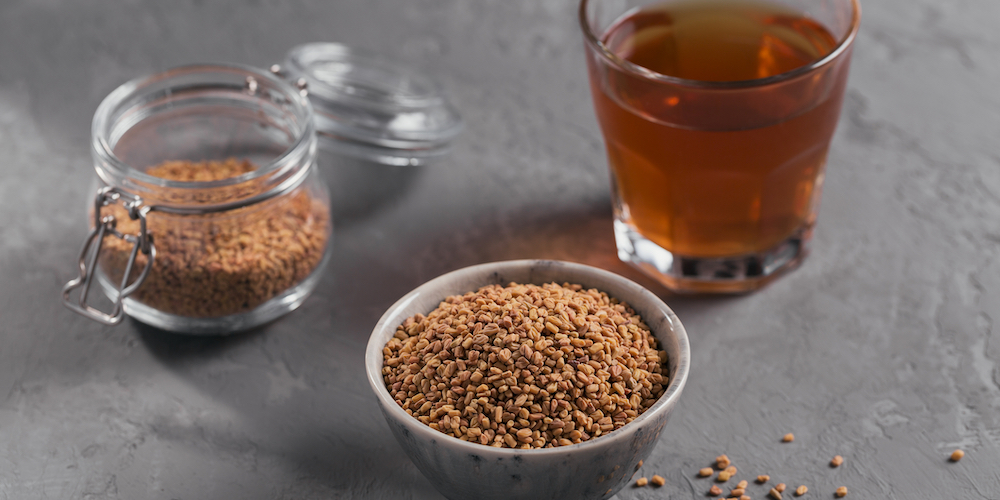
Fenugreek Tea Benefits for Skin
The skin, comprising water, protein, fats, and minerals, serves as the body’s largest organ. It plays a crucial role in safeguarding the body against harmful bacteria and maintaining body temperature. Moreover, the nerves within the skin enable the detection of sensations such as heat and cold.
To keep skin healthy, it’s essential to nourish and protect it from oxidative damage. One of fenugreek tea benefits is its excellent source of antioxidants that can help combat free radicals responsible for premature ageing, wrinkles, sun damage, and other skin conditions.
Also rich in vitamin C, which helps the body absorb iron and produce collagen. This protein provides a supportive structure for the skin while keeping it plump and hydrated. Furthermore, fenugreek has been used traditionally as an acne remedy due to its anti-inflammatory properties.
However, further research is needed to gain a better understanding of the potential benefits of fenugreek tea on skin health.

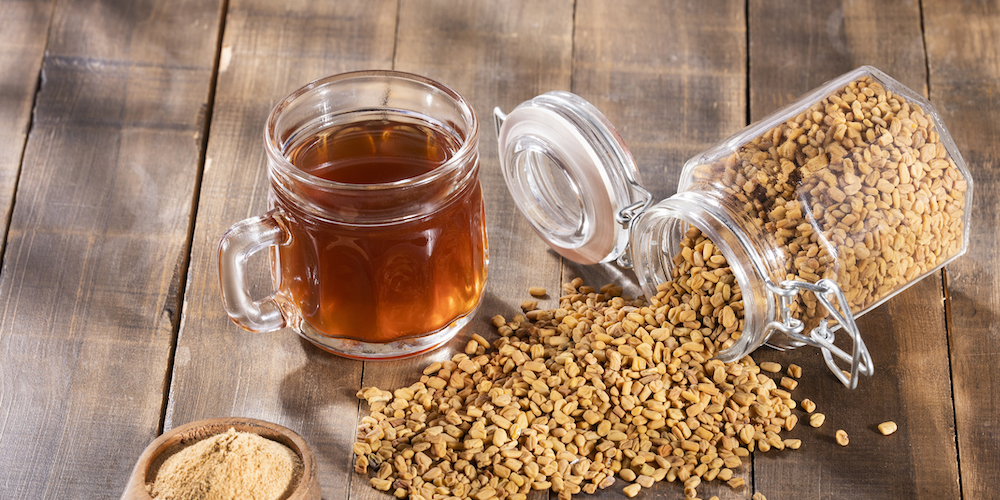
Fenugreek Tea for Diabetes
Diabetes occurs when your blood glucose, or blood sugar, is too high. Glucose is the body’s primary source of energy, which can come from the food you eat or be produced by your body. Insulin, a hormone made by the pancreas, helps glucose enter cells to be used for energy.
However, if you have diabetes, your body either doesn’t produce enough insulin or doesn’t use it effectively. As a result, glucose remains in the bloodstream and cannot reach the cells.
A study found that taking 5g of fenugreek seed powder twice daily for 2 months reduced fasting blood sugar levels, belly fat, body mass index, and haemoglobin A1c in individuals with type 2 diabetes. Additionally, fenugreek seeds, which are high in fibre, may also support blood sugar control in those without diabetes.
Numerous clinical trials have demonstrated that fenugreek seeds effectively improve metabolic symptoms related to type 1 and type 2 diabetes. These seeds can significantly lower blood glucose levels and enhance glucose tolerance in humans.
Consult your GP and diabetes healthcare team before using fenugreek for diabetes treatment to ensure safety. Use caution as it, like other blood sugar-reducing herbs, may lower blood sugars to potentially risky levels.
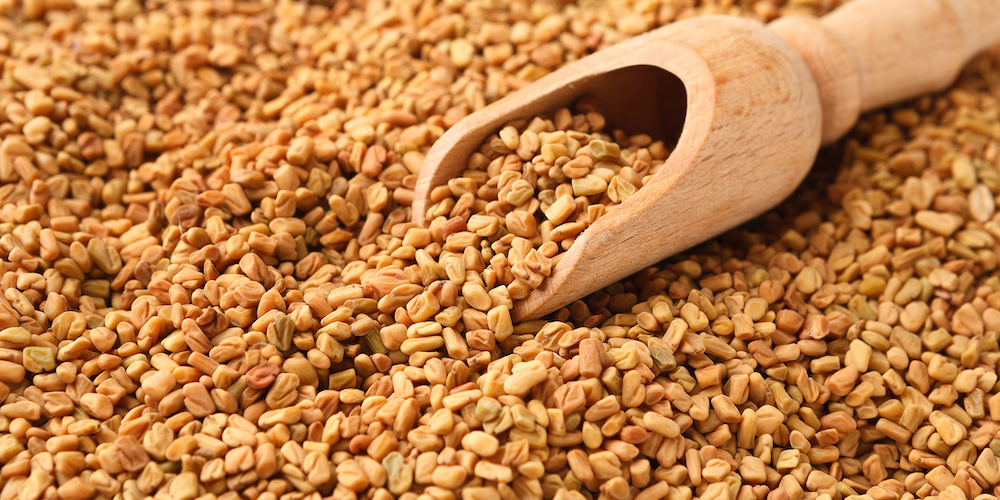
Fenugreek Tea Testosterone
Testosterone, the hormone responsible for male sexual characteristics, plays a crucial role in the body as a chemical messenger. However, it’s not just limited to males – females also produce testosterone, albeit in smaller amounts.
Specifically produced in the testicles by cells called Leydig cells, testosterone is an androgen that has various functions in men. These functions include regulating sex drive, bone mass, fat distribution, muscle size and strength, as well as red blood cell production.
Research has shown that it offers various benefits, such as an improved libido. In a recent study, men who were supplemented with 300 milligrams of fenugreek twice a day for 8 weeks experienced notable increases in their testosterone levels when combined with resistance training. Additionally, participants also saw a decrease in body fat without compromising muscle strength, unlike the control group.
In summary, preliminary research indicates that fenugreek tea benefits may enhance testosterone levels and improve sexual function in males.

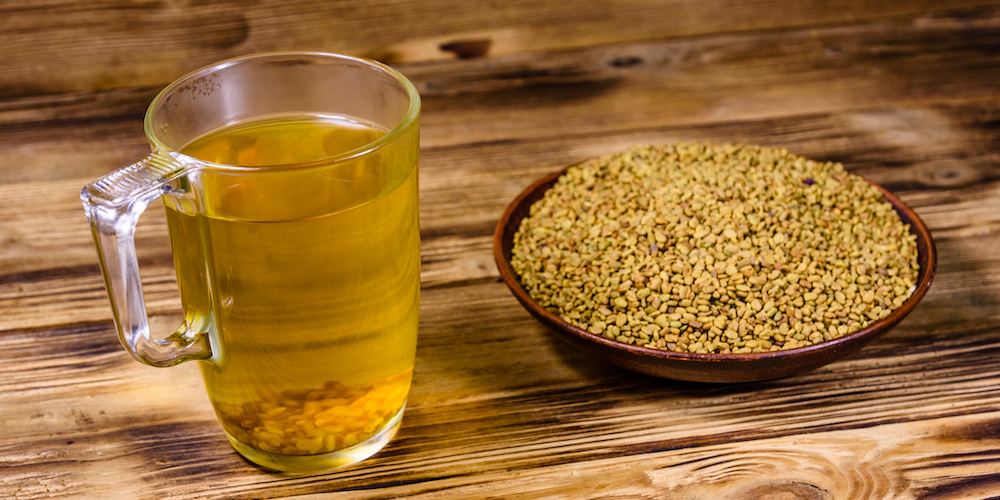
Can Aid you with Weight Loss
The World Obesity Federation’s recently published World Obesity Atlas 2022 predicts a staggering statistic: by the year 2030, it is estimated that one billion individuals worldwide, including one in five women and one in seven men, will be affected by obesity.
Known to curb the appetite and promote a sense of being full, resulting in decreased overeating and potential weight loss.
A study conducted in 2015 revealed that when nine overweight female Korean participants drank fennel tea, fenugreek, or placebo tea before lunch, those who consumed fenugreek tea experienced a reduced feeling of hunger and increased satiety. However, the tea did not result in decreased food consumption.
These fibre extracts can promote a sense of fullness thanks to their high fibre content.
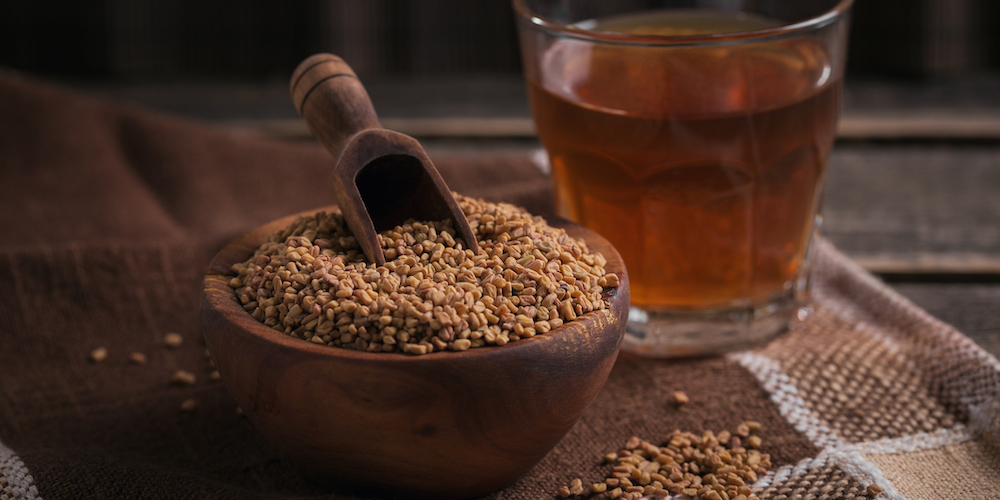
Fenugreek for Sperm Count Benefits
A healthy sperm count is essential for fertility. Sperm production is a complex process that depends on hormones such as testosterone and luteinizing hormone (LH). LH stimulates the production of testosterone, which helps produce healthy sperm.
Recent research suggests that the benefits of fenugreek tea may be beneficial in increasing semen volume and improving sperm count and motility in infertile men. In a recent study, the participants were supplemented with 600 milligrams of fenugreek seed extract daily for 2 months. As a result, their semen volume increased by 51%, total sperm count by 63%, and motility by 57%.
It’s essential to speak to your doctor before taking any supplements, including fenugreek. While the current research suggests that it may be beneficial for fertility, further studies are needed to confirm its efficacy in humans.

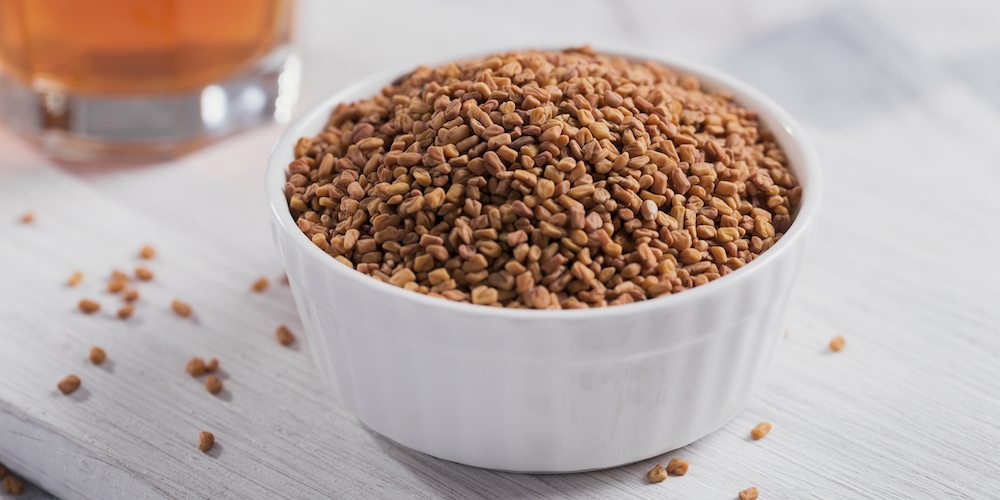
Fenugreek Tea for Cholesterol
Cholesterol, a waxy substance, is essential for cell growth, vitamin production, and hormone synthesis. However, excessive levels can be concerning. The body naturally produces the necessary amount of cholesterol through the liver. The remaining cholesterol comes from animal-based foods such as meat, poultry, and dairy products.
It is known for its therapeutic effects on cholesterol due to its high fibre content and antioxidant properties. In a study conducted in 2011, participants took either 5 grams of fenugreek seed powder or placebo before breakfast for 8 weeks.
The results revealed that the fenugreek group experienced a significant reduction in total cholesterol by 17%, triglycerides by 18%, and LDL-cholesterol by 24%. They also saw an increase in HDL-cholesterol (good cholesterol) levels.
Also, research suggests that fenugreek may have the potential to reduce levels of cholesterol and triglycerides.
It has been shown to have potential benefits for heart health. It works by regulating lipid levels in the body, which are fat-like substances that can build up in the bloodstream. This includes cholesterol and triglycerides.

Side Effects of Fenugreek Tea
Before brewing a cup of fenugreek tea, it’s important to consult with your doctor, especially considering its potent ingredients. Here are a few things to keep in mind:
1. Peanut Allergies: If you have a peanut allergy, be aware that there is a possibility of being allergic to fenugreek as well. These two plants have cross-reactivity.
2. Pregnancy Concerns: The effects of fenugreek tea on pregnant individuals remain inconclusive. It’s advisable to seek an alternative if you are expecting.
3. Blood Sugar and Hypoglycemia: It has the potential to lower blood sugar levels. Therefore, it is crucial to discuss with your doctor before incorporating fenugreek tea into your routine if you have diabetes or hypoglycemia.
This beneficial herbal remedy with many potential health benefits. However, before consuming it, consult with your doctor regarding any concerns or allergies you might have. Enjoy the sweet taste and aroma of this time-honoured herb and reap its benefits for your well-being today!

In conclusion
The remarkable benefits of fenugreek tea are numerous – from improving libido to weight loss and even heart health. It is important to remember that there may be side effects associated with drinking fenugreek tea, so one should always speak to their doctor before incorporating it into their diet.
With its sweet flavour and aroma reminiscent of maple syrup, as well as its essential dietary supplement qualities, let this tea enhance your overall well-being today!

 Loose Leaf Tea
Loose Leaf Tea Pyramids
Pyramids Tea Bags
Tea Bags Africa
Africa Assam
Assam Ceylon
Ceylon Chinese
Chinese Darjeeling
Darjeeling European
European Indian
Indian Japan
Japan Nepal
Nepal South East Asia
South East Asia Ayurveda Tea
Ayurveda Tea Black Tea
Black Tea Chai Tea
Chai Tea Flowering Tea
Flowering Tea Fruit Tisanes
Fruit Tisanes Green Tea
Green Tea Herbal Tea
Herbal Tea Matcha Tea
Matcha Tea Oolong Tea
Oolong Tea Organic Tea
Organic Tea Pu erh Tea
Pu erh Tea Rooibos Tea
Rooibos Tea White Tea
White Tea Asian Coffee
Asian Coffee Caribbean Coffee
Caribbean Coffee Central American Coffee
Central American Coffee South American Coffee
South American Coffee Coffee Blends
Coffee Blends Decaffeinated Coffee
Decaffeinated Coffee Espresso Coffee
Espresso Coffee Ethically Sourced Coffee
Ethically Sourced Coffee Flavoured Coffee
Flavoured Coffee Organic Coffee
Organic Coffee Single Origin Coffee
Single Origin Coffee Chocolate 1
Chocolate 1 Chocolate 2
Chocolate 2 Chocolate 3
Chocolate 3 Chocolate 4
Chocolate 4 Chocolate 5
Chocolate 5 Chocolate 6
Chocolate 6 Chocolate 7
Chocolate 7 Chocolate 8
Chocolate 8 Chocolate 9
Chocolate 9 Loose Tea Filters
Loose Tea Filters Tea Accessories
Tea Accessories Tea Bricks
Tea Bricks Tea Caddies
Tea Caddies Tea Caddy Spoons
Tea Caddy Spoons Tea Gift Ideas
Tea Gift Ideas Tea Infusers
Tea Infusers Tea Strainers
Tea Strainers